Supreme Court Rules in Favor of LGBTQ Employees in Major Victory for Trans, Gay Workers and Late Aimee Stephens
In one of the most major trans civil rights legal cases of our time and a huge milestone for legal precedent when it comes to LGBT employees generally, the Supreme Court has ruled that the 1964 Civil Rights Act, which prohibits sex discrimination in the workplace, does apply to sexual orientation and trans status.
Arguments for this case were made back in 2019, and brought the cases of Aimee Stephens, who lost her job after coming out as a trans woman; Gerald Bostock, who lost his job after joining a gay softball league; and Donald Zarda, who lost his job after coming out to a client. The ambitious and first-of-its-kind case — Stephens’ lawyer Chase Strangio noted “Tuesday may feature the first time the word “transgender” is spoken during oral arguments in the highest court in the United States. And when the justices look out from the bench and see my co-counsel and me at counsel table, it may be the first time they have looked at transgender attorneys defending our own existence before their powerful bench” — it carves out new and crucial ground for legal recognition of LGBT citizens at all in federal law. As I wrote in 2019,
…[this] comes after years of cumulative work on the state level by attorneys and legal strategists who have variously argued in different court cases addressing sexual orientation, gender identity and gender conformity in the workplace that the prohibition against discrimination on the basis of sex enshrined by the Civil Rights Act of 1964 applies to openly gay, transgender and/or gender nonconforming people. The gist of their argument has been that firing, restricting hours of, mistreating or refusing to hire someone because of their gender presentation is sex discrimination because it’s dependent upon their sex as assigned at birth — a cis man wearing a button-down and tie to work being fine while an AFAB person wearing the same thing isn’t is discrimination based on their sex. Similarly, the argument goes, discrimination against people with a same-sex partner is dependent upon their sex; the status of “having a wife” is neutral, and only becomes a category subject to discrimination when the sex of the person who has a wife is female. While several different lower courts agreed with this interpretation, the Supreme Court is the final arbiter of whether that legal interpretation will stand as federal law.
The full opinion, which can be read here, was written by Justice Gorsuch along with the Chief Justice and Justices Sotomayor, Breyer, Ginsburg and Kagan, and among other things delivers a pointed argument against historicist interpretations of the Constitution that call for legal interpretations in keeping with the personal views of the founding fathers:
“Those who adopted the Civil Rights Act might not have anticipated their work would lead to this particular result. Likely, they weren’t thinking about many of the Act’s consequences that have become apparent over the years, including its prohibition against discrimination on the basis of motherhood or its ban on the sexual harassment of male employees. But the limits of the drafters’ imagination supply no reason to ignore the law’s demands. When the express terms of a statute give us one answer and extratextual considerations suggest another, it’s no contest. Only the written word is the law, and all persons are entitled to its benefit.”
This ruling is especially significant given that plaintiff Aimee Stephens tragically passed away in May of this year, before seeing her case receive the justice it deserves. This ruling also comes the same week that the Trump administration, in the midst of a nationwide revolution and global pandemic, has made the effort to roll back Obama-era language that enshrines protection against discrimination for trans people in healthcare and medicine. It also comes while our community is still mourning the lives of Black trans people attacked and killed, like Iyanna Dior, Tony McDade, Nina Pop, Riah Milton, and Dominique Fells, as well as many more. While federal law — or any law — is only the beginning of what’s necessary to ensure trans dignity, power and life, this decision is beyond historic, and a testament to the work of an incredible generation of activists and organizers.
Taiwan Becomes the First Country in Asia to Legalize Marriage Equality
Feature image via HRC’s Twitter
In 2017, Taiwan’s constitutional court ruled in favor of marriage equality and gave parliament two years to get it done. Yesterday, they did! After debating three different bills to legalize same-sex marriage — taking into account that 67% of Taiwanese voters cast their ballots to reject same-sex marriage in a referendum last year — lawmakers voted to pass the most progressive one (the one that didn’t refer marriage as “same-sex family relationships” or “same-sex unions”). When Taiwan’s President Tsai Ing-wen signs the bill, it will become law. Taiwan becomes the first state or country in Asia to pass marriage equality legislation.
Despite staunch conservative lobbying and opposition to the vote in recent months tens of thousands of LGBTQ+ people gathered in the streets in the rain outside of parliament to await the decision.
On May 17th, 2019 in #Taiwan, #LoveWon. We took a big step towards true equality, and made Taiwan a better country. 🏳️🌈
— 蔡英文 Tsai Ing-wen (@iingwen) May 17, 2019
BREAKING: Legislators just passed article 4, which means #Taiwan just legalized same-sex marriage and will be implemented on May 24th#First in #Asia#LGBT #LoveWins pic.twitter.com/FDjWNBAxru
— Taiwan Equality Campaign 彩虹平權大平台 (@equallovetw) May 17, 2019
#LoveWins! @HRC congratulates all the advocates who have worked so long & hard for this incredible victory, making #Taiwan 𝐭𝐡𝐞 𝐟𝐢𝐫𝐬𝐭 𝐩𝐥𝐚𝐜𝐞 𝐢𝐧 𝐀𝐬𝐢𝐚 𝐭𝐨 𝐡𝐚𝐯𝐞 𝐬𝐚𝐦𝐞-𝐬𝐞𝐱 𝐦𝐚𝐫𝐫𝐢𝐚𝐠𝐞! Special shout out to #HRCGlobal partners Jennifer Lu & Benson Lee. pic.twitter.com/DyAMUUZUnF
— HRC (@HRC) May 17, 2019
Love Wins in Taiwan.
Daily Brief: https://t.co/PMRjFJgdOd pic.twitter.com/2OcUpOohWp
— Human Rights Watch (@hrw) May 17, 2019
Breaking news 🏳️🌈 #Taiwan becomes the first in Asia to legalise same-sex marriage. Just in time for #IDAHOBIT https://t.co/P2dlFY7zQc pic.twitter.com/kW1axD8RKf
— Stonewall (@stonewalluk) May 17, 2019
Before and after: Gay marriage supporters wait outside Parliament in Taipei and then celebrate the news that lawmakers voted to approve gay marriage.
The vote took place on the International Day Against Homophobia, Transphobia and Biphobia #IDAHOT
📷 @samafp pic.twitter.com/LkhpLD71Gy
— AFP News Agency (@AFP) May 17, 2019
Once the rain finally stopped, Equal Love Taiwan snapped a photo of the clouds breaking open to reveal a literal rainbow. Gay couples will be able to begin getting married on May 24th!
A Record Number of Women and LGBTQ Candidates Win Midterm Races as Democrats Take Back the House
This article was written by Heather Hogan and Natalie Duggins
Last night was a roller coaster of emotions as we watched the 2018 midterms results roll in, but the major story is one that allowed us to breathe a small sigh of relief for the first time in two years: Democrats took back control of the House of Representatives, which means Donald Trump will finally face some checks and oversight. Or, as Vox put it, “Democrats now have the power to make Trump’s life hell.” They can subpoena his tax returns, investigate everything from Russian election collusion to the ways his businesses are unethically benefitting from his presidency. And they will. They already have a list. It’s very long.
The House flip also means Republicans can’t try to ram through any more Obamacare repeals, cruel social services cuts, or enormous tax breaks for the wealthy. In fact, Republicans aren’t even going to get those bills to the floor for debate without the approval of the Democratic leadership. “Let’s hear it for pre-existing conditions [coverage],” presumed Majority Leader Nancy Pelosi cheered when she came out to give a speech after it was clear Democrats would regain control of the House.
A lot of other really exciting things happened.
Historic Wins for LGBTQ Candidates
It was a banner night for LGBTQ candidates. A rainbow wave, you might even say. More LGBTQ candidates won races across the country than ever before.
Sharice Davids toppled four-term incumbent Republican Kevin Yoder to win Kansas’ 3rd Congressional District. She’s the first LGBTQ person from Kansas elected to serve in the House and she joins New Mexico’s Deb Haaland, who also won her first election, as the first Native American woman to be elected to Congress. Senator Tammy Baldwin won reelection easily in Wisconsin, as did Oregon Governor Kate Brown. Angie Craig beat out notoriously homophobic Republican incumbent Jason Lewis in Minnesota’s 2nd District, which was a huge win for Democrats targeting suburban Midwesterners (who seem to have serious buyers’ remorse on Trump, according to the way they voted yesterday, including finally ousting Scott Walker from his Wisconsin governorship).
We also counted a record 47 LGBTQ women who won seats in state legislatures!
+ Georgia: Jennifer Webb, Park Cannon, Karla Drenner, and Renitta Shannon.
+ North Carolina: Deb Butler, Allison Dahle, Marcia Morey, and Bonnie Dawn Clark.
+ Ohio: Nickie J. Antonio
+ Connecticut: Beth Bye.
+ Maryland: Bonnie Cullison, Anne Kaiser, Maggie McIntosh, and Mary Washington.
+ Massachusetts: Kate Hogan, Elizabeth Malia, and Sarah Peake.
+ New Hampshire: Gerri Cannon and Lisa Bunker.
+ Rhode Island: Deb Ruggiero.
+ Illinois: Kelly Cassidy and Maggie Trevor.
+ Kansas: Susan Ruiz.
+ Oklahoma: Kay Floyd.
+ Texas: Jessica González, Mary González, Celia Israel, Julie Johnson, and Erin Zwiener.
+ Arkansas: Tippi McCullough.
+ New York: Deborah Glick.
+ Wisconsin: Marisabel Cabrera and JoCasta Zamarripa.
+ Colorado: Daneya Esgar, Sonya Jaquez Lewis, Joann Ginal, and Leslie Herod.
+ Iowa: Liz Bennett.
+ Montana: Kim Abbott and Andrea Olsen.
+ California: Susan Eggman.
+ Oregon: Tina Kotek and Karin A. Power.
+ Washington: Laurie Jinkins, Christine Kilduff, Nicole Macri, Emily Randall, and Claire Wilson.
(Some state races are too close to call at this point, so this list is likely to grow. We’ll update it throughout the day.)
In Colorado, Jared Polis became the first openly gay man to be elected Governor, which, as many savvy Twitter users have pointed out, means Masterpiece Cake Shop homophobe Jack Phillips will now be governed by a gay. Chris Pappas became New Hampshire’s first openly gay Congressman. Key West’s Teri Johnson became the first lesbian mayor in Florida. And Beth Bashert became Ypsilanti, Michigan’s first lesbian mayor.
More Women Than Ever Were Elected to Congress
These midterms were historic for the number of firsts and for the overall number of women who ran for and were elected to office. According to the Center for American Women and Politics, a record 428 women ran for Congress or governor; 210 won their primaries and made it to general election day; and over 100 won last night. One-third of those were women of color. Among them, as mentioned above, are Sharice Davids and Deb Haaland, the first Native American women elected to Congress. Michigan’s Rashida Tlaib and Minnesota’s Ilhan Omar are the first Muslim women elected to Congress. Sylvia Garcia and Veronica Escobar will be the first Latinx women from Texas to serve in Congress. Ayanna Pressley will be the first Black woman from Massachusetts to serve in Congress. And Democratic Socialist Alexandria Ocasio-Cortez, who shocked the world when she won her primary earlier this year, coasted to victory; at 29, she’s the youngest woman ever elected to Congress.
Yes on 3
One of the biggest LGBTQ wins of the night came in Massachusetts, where voters overwhelmingly chose to protect a trans rights law that was passed two years ago to ensure trans people are able to use public accommodations that match their gender identity. It’s the first time a state has defended trans rights by popular vote, and it was an enormous victory. 19 other states have passed protections for trans people in the last few years, and if Massachusetts — one of the most historically LGBTQ-friendly states — had voted to overturn their relatively new law, activists feared a wave of similar steps backward around the country.
The National Center for Transgender Equality called Tuesday’s vote “a stunning rebuke of anti-transgender lies and prejudice.” Mason Dunn, the Yes on 3 co-chair, said, “Voters here in Massachusetts have sent a powerful, unmistakable message that this is a state that values, welcomes, and honors transgender people.”
Florida Amendment 4
Another huge victory on Tuesday came out of Florida, where voters approved Amendment 4 by a 60%+ supermajority, which will automatically restore voting rights to around 1.5 million people who were previously convicted of felonies. Obviously Black citizens, who are disproportionately arrested and incarcerated, will be most affected by this groundbreaking vote (as will the Democratic party).
Earlier this year, a federal judge ruled that Florida’s Jim Crow era voting restoration policy — which has only approved 3,000 people since 2011 — was unconstitutional. “Elected, partisan officials have extraordinary authority to grant or withhold the right to vote from hundreds of thousands of people without any constraints, guidelines, or standards,” the judge wrote. “Its members alone must be satisfied that these citizens deserve restoration… The question now is whether such a system passes constitutional muster. It does not.”
Kentucky and Iowa are now the only states that completely ban people from voting, even after completing their felony sentences.
More to Come
Tuesday’s election results were not without their heartbreaks. Andrew Gillum narrowly lost the Florida Governor’s race, despite running a nearly perfect campaign. Beto O’Rourke, who looked like he really might unseat Ted Cruz in Texas’ Governor’s race for most of the night, lost by a slim margin. Alabama approved the most anti-abortion ballot measure since Roe vs. Wade; in a sweeping victory, voters agreed to add a state constitutional amendment to protect “the rights of unborn children.” (They also voted for an amendment to ensure public officials can display the Ten Commandments on public property.) West Virginia voters approved a similar anti-abortion amendment, which will change the state Constitution to read “nothing in this Constitution secures or protects a right to abortion or requires the funding of abortion.” And Republicans maintained control of the Senate, which they were expected to do, and which will continue to empower them to stack the courts with Conservative judges.
There are still some races up in the air.
As of this morning, Stacey Abrams — whose supporters faced rampant, unmitigated voter suppression and gerrymandering — is losing the Georgia Governor’s race by less than 100,000 votes. She has promised not to concede to her vile opponent until every vote is counted; her team believes there are still enough votes out there for her to force a run-off.
LGBTQ candidate Gina Ortiz Jones is neck-and-neck with Will Hurd in Texas’ 23rd District. And in Arizona, bisexual candidate Kyrsten Sinema is in a near-tie in her Senate race; many forecasters think it will be later this week before we officially get those results.
The fight is going to be as fierce as ever in the coming years, but Tuesday’s results finally gave us some much-needed hope.
11/8/18 Update: Katie Hill has bested Steve Knight in California’s 25th Congressional District.
11/11/18 Update: In Texas’ 23rd Congressional District, Republican Will Hurd has claimed victory, but Gina Ortiz Jones has refused to concede until every ballot is counted.
11/12/18 Update: After a week of meticulous ballot counting, Cook Political Report has called the Arizona Senate race for bisexual candidate Kyrsten Sinema. She will be the first Democrat to represent Arizona in the U.S. Senate in 25 years. She will also join Tammy Baldwin as the only other openly LGBTQ Senator.
We will continue update this post as more information becomes available.
Federal Judge Sides With Gavin Grimm in History-Making Ruling for Transgender Rights
Gavin Grimm was thrust into the national spotlight as an outspoken voice in the fight for trans rights when his local school board passed a discriminatory transphobic bathroom policy aimed specifically at Grimm. The Gloucester County School Board in Virginia passed the policy, which forced trans students to use the bathroom associated with their sex assigned at birth, in 2014.
At the age of 15, Grimm became the named plaintiff in Gavin Grimm v. Gloucester County School Board. His case gained national attention and won at the 4th US Circuit Court of Appeals, then was picked up by the U.S. Supreme Court. However, things that weren’t looking good after Trump rescinded the Obama-era guidance on protecting trans people under Title IX and the Supreme Court used this as justification to send the decision back to the 4th circuit, who sent it back to the district court, prompting the school board to argue for the case to be dismissed.
Grimm, who is now 18 and on his way to college, finally got good news yesterday when the U.S. District Court of the Eastern District of Virginia denied the school board’s motion to dismiss the case, affirming that Title IX and the Constitution protect transgender students from being excluded from restrooms that align with their gender identity.
By ruling in favor of Grimm, Judge Arenda Wright Allen set the lawsuit back into motion. Judge Wright Allen even went so far as to say that Grimm’s case had merit, writing that Grimm “has sufficiently pled a Title IX claim of sex discrimination under a gender stereotyping theory” and that the school board’s argument was “resoundingly unpersuasive.”
(You may remember Judge Wright Allen, who is also the first black woman appointed as a federal District Court judge in Virginia, as the badass who overturned Virginia’s same-sex marriage ban in 2014.)
In an interview with the Huffington Post, Grimm said, “It’s something we’ve all known for a very long time, that this is illegal and unacceptable, but to finally have the court make that in plain language is really fantastic.”
Grimm’s act of resistance could have huge implications for trans rights across the nation. At the heart of his case is the argument that trans discrimination is already illegal under existing sex discrimination laws including the federal Title IX and existing civil rights law. If it’s appealed to the Supreme Court again and results in a favorable ruling, it could set the standard for protecting trans rights across America. It could effectively invalidate any state’s transphobic “bathroom bill” and potentially protect transgender people in the U.S. in the workplace, housing, public schools, healthcare, and in other places where sex discrimination is already against the law.
His case is flanked by several other federal court decisions that have upheld that sex discrimination laws protect transgender people. Paired with the support of Judge Wright Allen, it’s probable that Grimm’s case may change the course of history for trans rights. The school board will most likely appeal again, but Grimm is ready to keep fighting.
In a press statement from the ACLU of Virginia, who represented Grimm, Grimm said, “I feel an incredible sense of relief. After fighting this policy since I was 15 years old, I finally have a court decision saying that what the Gloucester County School Board did to me was wrong and it was against the law. I was determined not to give up because I didn’t want any other student to have to suffer the same experience that I had to go through.”
Black Voters Defeat Roy Moore in Alabama, Infusing Liberals With a Small Hope at the End of Bleak Year
There are lots of lessons to be learned from yesterday’s Alabama special election, and in the less-than-12 hours since Doug Jones stunned the country by defeating Roy Moore for the senate seat left vacant by Jeff Sessions, Twitter has become even more of a take blizzard than usual. Lots of liberals are calling it a repudiation of Trump. Lots of conservatives are calling it a repudiation of Harvey Weinstein. History hasn’t yet named the trend, but what we can know for absolute sure is that despite massive confirmed voter suppression efforts, black Alabamians — 144,000 of whom were eligible to vote for the first time after the recent repeal of a Jim Crow-era disenfranchisement law — tipped the scales in Jones’ favor.
While black Alabamians make up 26 percent of the population, they made up 28 percent of voters yesterday; turnout was especially strong in large black population centers like Birmingham and Montgomery. Yesterday afternoon, Birmingham City Councilor Sheila Tyson told Vox reporter Ella Nilsen: “The lines have been long, the parking lots jam-packed. These African American communities are turning up, and they are turning out.”
Over at The Atlantic, Vann R. Newkirk II broke it down like this: “These results demolish the pre-established media narrative about black voters in the state, and defy conventional wisdom. Black voters were informed and mobilized to go vote, and did so even in the face of significant barriers. I previously noted that Alabama is one of the hardest states in the country to vote — especially so for black voters, and that voter-suppression efforts could have had strong effects on black votes. Tuesday night’s returns are all the more remarkable because of the surge of turnout that appears to have taken place in spite of those very real barriers.”
Roy Moore’s support was unsurprisingly strong with white men and women, regardless of education or income, especially among older white people and white evangelicals.
The Washington Post‘s breakdown of yesterday’s voting demographics juxtaposed with the projected shift in the U.S.’s demographics over the next 30 years lays bare the attempts of legislators at state and national levels to suppress black voters and implement cruel immigration immigration policy for South American and Muslim countries. It’s not about crime and its not about terrorism. It’s about white supremacy, literally: Making sure white people stay in power by making sure people of color can’t vote.
Yesterday, however, all those Republican tactics failed.
It’s worth noting, of course, that this election didn’t happen in a vacuum. Doug Jones didn’t win a senate seat in Alabama against your average Republican opponent. If Roy Moore had been a racist, sexist, homophobic, Islamophobic theocrat who’d been suspended from the Alabama Supreme Court more than once for refusing to follow the rule of law because of his crusade to legislate the Old Testament, it seems likely he’d have won in a landslide. It took multiple deeply reported accusations of sexual assault against teenage girls and the news that he’d been banned from a mall because of his predatory behavior for Jones to eek out a victory.
But at the end of the day, Moore didn’t win, and that’s a reason to be joyful; when you add that to November’s elections, where a record number of POC and trans folks rallied their way into office, it’s even a reason to hope. Democrats are ready to compete everywhere now, and the people who’ve been oppressed by the GOP their entire lives are ready to take office for themselves. It’s been a good month for real and symbolic victories.
Of course, Joy Reid always says it best: “Every so often it’s good to be reminded that that the good guy CAN win. What Doug Jones did in prosecuting those Klansmen was heroic. He is by far the better man-the better human being. And damned if he didn’t win in Alabama. Amazing. Black and New South/Millennial voters did it.”
We Won So Many Things: LGBTQ+ People and POC Kicked Ass In the 2017 Elections
It’s impossible to overstate the bleak and demoralizing year we’ve suffered since Donald Trump was “elected” president. I still almost can’t bring myself to type it in a sentence. Every new day has unleashed some fresh horror as Trump has continued his relentless attacks on people of color, immigrants, Muslims, trans people, women, the poor, the foundations of our democracy, and reality itself. One of the most distressing things about 2017 is that that no one has been willing or able to stop the tide of the Trump administration. Each executive order, each proclamation via tweet: nearly all of his actions have gone unchecked and empowered the most loathsome people in this country to make their bigotry even more public. Yesterday’s 2017 election seemed like it would be more of the same, especially as the polls in the Virginia governor’s race tilted toward Republican Ed Gillespie, who cozied up to Trump and his white supremacist rhetoric the longer his campaign went on.
But no! Holy cats, no! Yesterday’s election was a sweeping victory around the country, at all levels of governance, for progressives who stand against Donald Trump. The Washington Post called it “a judgment on President Trump and the politics of polarization.” The New York Times said it was the “first forceful rebuke of President Trump and his party.” The Los Angeles Times named it “a night of political retaliation against President Trump.” And good ol’ CNN predicted that “Republicans will wake up Wednesday in a nightmare.” Welcome, Republicans!
Here are the things we won last night
+ Jenny Durkan will become Seattle’s first lesbian mayor.
Congratulations, @JennyDurkan. So many people making history tonight! 💗 https://t.co/qBe7OmIK5w
— GLAAD (@glaad) November 8, 2017
+ In Virginia, trans woman Danica Roem unseated 25-year incumbent Bob Marshall, the very guy who wrote the bill to ban trans students from the bathrooms that match their gender identities. In total, four women beat four white men (three incumbents) in VA’s House of Delegates races.
Powerful statement from @pwcdanica, first transgender member of VA assembly. Watch this: pic.twitter.com/d5fZ43vSCF
— Will Drabold (@WillDrabold) November 8, 2017
+ Virginia also elected its first Latinas to the state House. Elizabeth Guzman and Hala Ayala both unseated Republicans.
Elizabeth Guzman and Hala Ayala both defeated Republican incumbents tonight to become the first-ever Latinas elected to the Virginia House of Delegates! #ElectionDay #VirginiaElection pic.twitter.com/6XApF5WTrO
— Women's March (@womensmarch) November 8, 2017
+ Kathy Tran became the first Asian American to be elected to the VA state legislature.
Kathy Tran came to the U.S. as a refugee from Vietnam when she was an infant. Tonight, she became the first Asian American woman elected to the Virginia House of Delegates. Congrats @kathykltran! pic.twitter.com/NSynRwHJ7d
— Women's March (@womensmarch) November 8, 2017
+ In Minneapolis, Andrea Jenkins became the first openly trans woman of color to be elected to the city council of a major U.S. city.
To all of my Trans & Gender Diverse family, I see you, I hear you & I will be there for you. We must resist. We must be intersectional!
— Andrea Jenkins (@andreaforward8) February 23, 2017
+ Yesterday saw huge wins for black politicians at the mayoral level.
African Americans were elected mayor for 1st time:
Statesboro GA, Jonathan McCollar
Georgetown SC, Brendan Barber
Milledgeville GA, Mary Parham Copelan
Helena MT, Wilmot Collins
Cairo GA, Booker Gainor
St Paul MN, Melvin Carter
&
Charlotte NC –> Vi Lyles, 1st Black female mayor— Kristen Clarke (@KristenClarkeJD) November 8, 2017
+ In Georgia, two Democrats unseated Republicans in state legislature races. From Vox:
The result in HD-117 should be particularly alarming for Republicans … Democrats are eager to take a big swing at the 2018 gubernatorial election and — if they can win it — have more influence on the post-2020 redistricting process and thus a better shot at the legislature. Special elections only tell you so much, but tonight’s wins bring Georgia Democrats that much more hope of winning a year from now.
+ Women with no political experience unseated the men who mocked them. From the Philadelphia Inquirer:
Ashley Bennett, 32, a psychiatric emergency screener from Egg Harbor Township who showed up at an Atlantic County Freeholder’s meeting to protest comments made by Freeholder John Carman mocking the Women’s March, and then decided to run for his seat, knocked Carman off the board Tuesday.
+ Tyler Titus was elected to the Eerie School Board.
Another historic win! Tyler Titus won his Erie School Board seat to become first openly trans person ever elected in PA! #ElectLGBTQ pic.twitter.com/KFlsT69rr6
— @lgbtqvictoryfund on bluesky (@VictoryFund) November 8, 2017
+ New Jersey elected Democrat Phil Murphy as governor, which, as Rachel Maddow noted last night, was due in large part to Chris Christie being “the most unpopular politician in the history of political polling in the United States.” NJ also elected Sheila Oliver, the state’s first black Lt. Governor. At Murphy’s victory party, Oliver said, “This may not be the first glass ceiling I have broken, but it is certainly the highest. And I hope somewhere in this great state of New Jersey, a young girl of color is watching tonight and realizing that she does not have a limit to how high she can go.”
Democrats make history again as Sheila Oliver is elected the next Lieutenant Governor of New Jersey to serve alongside her running mate Phil Murphy. pic.twitter.com/N3orcU0YKN
— Keith Boykin (@keithboykin) November 8, 2017
+ Ravinder Bhalla of Hoboken, NJ became the first Sikh American to be elected mayor of a major U.S. city.
Thank you Hoboken. I look forward to being your Mayor! #TeamBhalla #FinishedStrong pic.twitter.com/UKPuXkDWGX
— Ravinder S. Bhalla (@RaviBhalla) November 8, 2017
+ Lisa Middleton became the first openly trans person to be elected to a non-judicial post in California.
Lisa Middleton, who just won a city council seat in Palm Springs, will be California's first openly transgender non-judicial elected official https://t.co/4icC6X4s7y pic.twitter.com/WEcIOs8c5y
— Casey Tolan (@caseytolan) November 8, 2017
+ Dems flipped governing trifectas in New Jersey and Washington. From New York Magazine:
In addition to an array of wins in Virginia, New York, Florida, and elsewhere on Tuesday, Democrats took full advantage of limited opportunities to begin to reverse lopsided Republican control of state governments. Going into this off-year election, Republicans had “trifecta” control of the executive branch and both legislative chambers in 26 states, while Democrats had just six. Now Democrats have two more.
This is a wacky thing to say, but I’m not sure that’s even all the good news to come out of yesterday. If I missed anything, let me know. In the meantime, don’t relax! We’ve got to keep resisting at every level in every way!
German Parliament Closes Out Pride By Paving The Way For Marriage Equality
Feature image via Getty
Just when I’d forgotten Autostraddle’s “We Won a Thing” tag exists, I woke up to the news that German parliament has finally approved same-sex marriage! The vote passed 393 to 226 on Friday after Chancellor Angela Merkel — presumably determined not to be outdone on the civil rights front by a country led by a deranged circus clown and a soulless theocrat — suddenly decided her Christian Democratic Union party members could “vote their conscience” on the issue. Merkel herself voted against the bill because blah blah one man one woman, but at the same time she “hopes that the vote today not only promotes respect between different opinions but also brings more social cohesion and peace.”
The marriage equality bill also introduced full adoption rights for same-sex couples (which Merkel does agree with).
Autostraddle reader Maria clarified the politics behind the decision:
On Monday Merkel said something about marriage equality which was “never gonna happen” for the first time ever at an event – it was sort of an interview with live audience for a German women’s magazine. People aren’t sure how and why this happened, but what’s really obvious is that Merkel and her party, CDU, felt a lot of pressure after every single other party that is a possible partner for a coalition after the general election in September said they won’t negotiate marriage equality.
Now, it is pretty smart to get rid of that topic beforehand. What is not so smart: After years of saying “no, never” getting to a place of “maybe, everyone should vote their belief” while parliament is still able to vote. This was the last active week for our parliament in this term. Nothing would have happened if this event had taken place a week (!) later. This wasn’t staged, it wasn’t planned.
So after that, it was really the other parties – and the coalition partner SPD (who was, but for complicated reasons, complicit in stalling the vote for about 4 years) – who took the initiative. Everyone was very much “fuck this shit, we’re done with this” at that point. They were just doing it. They scheduled the vote AGAINST the protest of Merkel and the CDU, knowing they had the majority.
Cheers broke out in parliament and parties broke out in the street after the “marriage for all” amendment was approved.
The moment Germany legalised same-sex marriagehttps://t.co/qnXa9A5LDl pic.twitter.com/64AGM9JeMB
— BBC News (World) (@BBCWorld) June 30, 2017
Parliament is heading into recess, after which the the bill will head to upper parliament for approval, and then President Frank-Walter Steinmeier will sign it into law. The New York Times expects gay Germans to be marrying each other by fall.
Congratulations, German gays! You really outdid yourself with your Pride celebration this year!
Finally Actual Good News: Standing Rock Sioux Win, Army Corps of Engineers Denies DAPL Easement
feature image via shutterstock
Today the Army Corps of Engineers announced that it will not approve easement to the Dakota Access Pipeline to be built underneath Lake Oahe, where it would endanger the wellbeing and water supply of the Standing Rock Sioux. This moment comes after months of organized resistance by water protectors in Standing Rock and the coordination of hundreds of different Native American tribes and nations, and most recently after over 2000 US veterans announced they would travel to Standing Rock to provide a nonviolent “human shield” for water protectors. Water protectors have endured incredible hardships in their struggle, from law enforcement using rubber bullets and water cannons against them in freezing temperatures to an attempted blockade of supplies into the camps. Instead of using the current proposed route for the DAPL, the Army Corps of Engineers says it will plan to put together an environmental impact statement, which many hope will show that the pipeline would be too dangerous and expensive to be worth completing.
The Standing Rock Sioux Tribal Chairman Dave Archambault II issued a statement, which can be read in full here, that acknowledges the significance of the victory and thanks all those who worked for it.
“Today, the U.S. Army Corps of Engineers announced that it will not be granting the easement to cross Lake Oahe for the proposed Dakota Access Pipeline. Instead, the Corps will be undertaking an environmental impact statement to look at possible alternative routes. We wholeheartedly support the decision of the administration and commend with the utmost gratitude the courage it took on the part of President Obama, the Army Corps, the Department of Justice and the Department of the Interior to take steps to correct the course of history and to do the right thing.
The Standing Rock Sioux Tribe and all of Indian Country will be forever grateful to the Obama Administration for this historic decision.
We want to thank everyone who played a role in advocating for this cause. We thank the tribal youth who initiated this movement. We thank the millions of people around the globe who expressed support for our cause. We thank the thousands of people who came to the camps to support us, and the tens of thousands who donated time, talent, and money to our efforts to stand against this pipeline in the name of protecting our water. We especially thank all of the other tribal nations and jurisdictions who stood in solidarity with us, and we stand ready to stand with you if and when your people are in need.
The statement also calls for continuing respect for treaty rights and Indigenous nationhood. With the prospect of a Trump administration hanging overhead, that certainly isn’t a given; as per this statement from Senator Heidi Heitkamp (as tweeted by Chris Geidner), the Trump administration has already voiced its support for the pipeline, and she seems to hope that the project will continue.
Dem Sen. Heidi Heitkamp, who met with Trump last week, says "today's move doesn't actually bring finality," pipeline "remains in limbo." pic.twitter.com/TMWI9EO1Ue
— Chris “Law Dork” Geidner (@chrisgeidner) December 4, 2016
As Ruth Hopkins tweets, it’s also possible that the team responsible for building the pipeline will continue with work anyways. Local law enforcement, which has so far demonstrated violence toward water protectors, has issued a statement claiming it “does not have an opinion” and that “our role is to enforce the law and that is what we will continue to do.”
https://twitter.com/RuthHHopkins/status/805533799060819969
Regardless of the challenges that still lie ahead, from the DAPL project to Native safety and sovereignty in general, this news is a major victory for the Standing Rock Sioux and their allies and proof of the power and determination of the thousands of people who have organized together over many months and despite great personal risk.
30 Things That Made Us Cry On Marriage Equality Day, Take A Kleenex
Half an hour after the Supreme Court announced its historic 5-4 decision to make marriage equality a 50-state reality in the United States, it became apparent to our entire Autostraddle dot com staff that we weren’t going to be able to do anything but cry and laugh and cry some more all day today. Such jubilation! Such celebration! So many tears! Here are the 25 things that made us cry (and cry-laugh) the most (in no particular order).
1. Justice Kennedy’s majority opinion
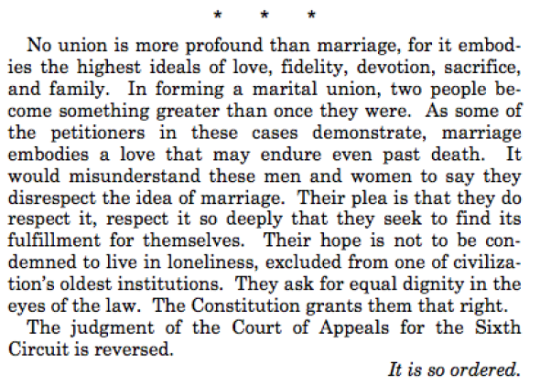
2. President Obama’s speech
3. The White House changing its social media profile photos

4. This mental image of Joe Biden
https://twitter.com/JillBidenVeep/status/614439317558181889
5. Congressman John Lewis’s response
Races don't fall in love, genders don't fall in love–people fall in love. #SCOTUSMarriage
— John Lewis (@repjohnlewis) June 26, 2015
6. Carrie and Bren’s A-Camp wedding

7. Deep south states issuing marriage licenses to gay couples
Special note: this first picture features SARAH, former Managing Editor of Autostraddle.com!
The second same-sex couple to legally wed at Fulton County courthouse fills out paperwork while choking up. #gapol pic.twitter.com/FwRXvn7Q9F
— Greg Bluestein (@bluestein) June 26, 2015
Beatrice Cantu and Siria Jones first same sex couple to get married @hidalgocounty. Congratulations! pic.twitter.com/mK9RG1Wagt
— Hidalgo County (@HidalgoCountyTX) June 26, 2015
https://twitter.com/iamstevenhale/status/614500627369095168
8. Notorious RBG Memes

https://vine.co/v/eJzhTFvLK0K
9. Kristin Russo and Jenny Owen Youngs
Sharing this picture of our host, @kristinnoeline, and her wife, @jennyowenyoungs, just feels especially right today! pic.twitter.com/8xkZwaTtUm
— Real LGBTQ+ Stories (@FirstPersonPBS) June 26, 2015
10. Taylor Hatmaker’s insight
https://twitter.com/tayhatmaker/status/614445831261818880
https://twitter.com/tayhatmaker/status/614490861267607552
https://twitter.com/tayhatmaker/status/614481658406768640
11. Big Gay Branding

364 days a year, we hate big gay branding. But today? Today is not like those other days. Also ice cream is delicious.
12. The true reality of marriage equality
This is what #MarriageEquaility looks like. I know, I know. Western civilization is crumbling. pic.twitter.com/tjkmrXYXwC
— Tom Gibbons (@dthomasg) June 26, 2015
13. Proud bald eagles

14. Chick-fil-(g)a(y)
https://twitter.com/elsplice/status/614457948593647616
15. Laneia and Megan’s wedding photos
https://instagram.com/p/4Zlh0VhFZD/
16. Vox’s visual marriage equality retrospective
The march of marriage equalityWatch marriage equality come to all 50 states. Read about it here: http://bit.ly/1LtTaeD
Posted by Vox on Friday, June 26, 2015
17. Samira Wiley’s Mom
18. OMG Seattle!
https://twitter.com/Bipartisan206/status/614463473485942785
19. Supergay Superheroes
At a Dallas comic book store. #SCOTUS pic.twitter.com/jAdx9DRWc6
— Michael Li 李之樸 (@mcpli) June 26, 2015
20. The first couple to marry in Dallas County
First couple to get marriage license in Dallas County. They have been together 55 years. @CBSDFW pic.twitter.com/92ri2sTEUc
— Arezow Doost (@ArezowDoost) June 26, 2015
21. Mari’s wedding photos

22. President Obama calling Jim Obergefell
23. This Republican commentator
Who was moved to tears by the response of gay people outside the Supreme Court.
24. Robin and Carly’s wedding
25. This meme

26. Aja & M’s Wedding Photos
https://instagram.com/p/4Z3ZEbgyDo/?taken-by=dearjonesey
27. Lauren Morelli and Samira Wiley being adorable
28. This Video
29. Gabby and Laura in D.C. for the big day
“Gabby and I just got interviewed by Univision and when they asked how we feel about the marriage decision, Gabby pulled a Selena and said “Estoy muy excited.”” – Laura
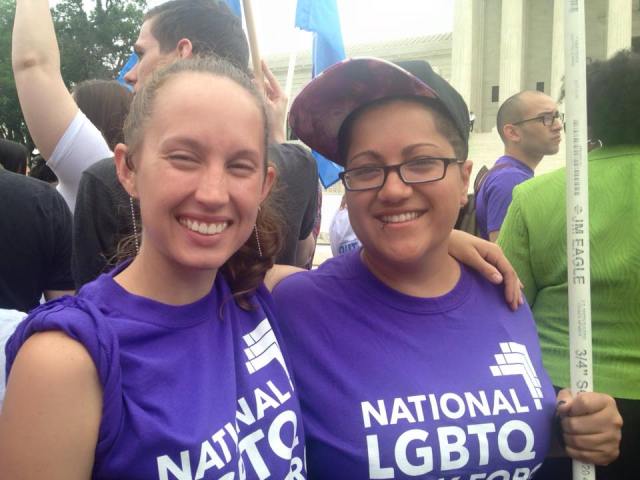
30. YOU GUYS
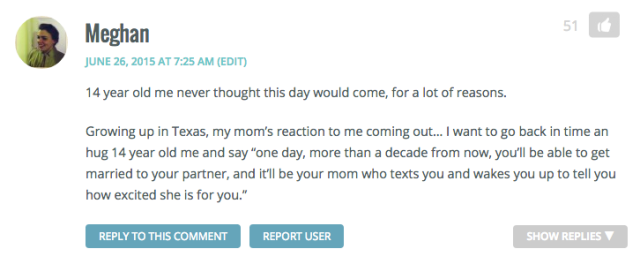
It is so ordered! Stay hydrated and have one hell of a Pride weekend! We fucking love you!
BREAKING: Supreme Court Greenlights Marriage Equality, WE WON A MAJOR THING
In a historic decision, the Supreme Court has ruled that same-sex marriage is a constitutional right. The 5-4 decision, which was written by Justice Kennedy, ruled that states are no longer allowed to ban marriage between two gay people.
This ruling will allow same-sex couples the opportunity access many of the same rights and privileges as different-sex couples, like filing taxes jointly, hospital visitation without having to file a power of attorney, inheriting a spouse’s estate without being taxed for it, sponsoring a spouse for US citizenship, and more. Joint adoption of children will become easier for many, although there are still aspects of same-sex parenting that will likely pose legal challenges for families.

April DeBoer and Jayne Rowse with three of their children, via GLAD
However, as we all know well, this ruling (while groundbreaking and life-changing for many!) doesn’t fix everything. For instance, discrimination on the basis of sexual orientation and trans status is still legal in many states; it’s entirely possible for a now legally married same-sex couple to be fired from their jobs, or for the child they are both legal parents of to be refused admission to a school because of their parents’ sexual orientations. In recognition of the many hurdles that LGBT people still face and that won’t be addressed by this ruling, organizers with GetEQUAL and other organizations are standing outside the Supreme Court today carrying a banner saying “LGBTQ Liberation Can’t Wait” and dressed in black “reminding the American public, mainstream media, and other LGBTQ organizations that we must work toward liberation for all LGBTQ people.”
The plaintiffs in the cases that resulted in this ruling — April DeBoer and Jayne Rowse of Michigan, James Obergefell, Ijpe DeKoe and Thomas Kostura, and the same-sex couples involved in the case of Tanco v. Haslam — are examples of how much of a milestone this ruling will be for many LGBT families. WIth federal marriage equality, James Obergefell would have been able to have his name listed on his husband’s death certificate as a spouse when John Arthur passed away in 2013; April DeBoer and Jayne Rowse will have an added legal advantage when it comes to securing their rights to parent their children; Army Reserve Sergeant First Class DeKoe will have at least this one legal right against which to measure his military service to the US. This ruling is a landmark one that will likely be discussed in history books, but for right now and more importantly, it’s one that will make a difference in the lives of many in our community who need it urgently.
We Won a Thing: Ireland Overwhelmingly Votes Yes On Same-Sex Marriage
Feature photo via The Telegraph’s Twitter
Yesterday, Ireland held a referendum on the question of marriage equality, in which Irish citizens were asked whether or not they agreed with the statement: “Marriage may be contracted in accordance with law by two persons without distinction as to their sex.” Voters flocked to the polls in droves to vote Yes, almost 60,000 of them expatriates.
This very morning, the votes were counted and an overwhelming majority — about 62 percent! — voted in favor of same-sex marriage, which means Ireland will become the 20th country to legalize gay marriage at a national level, and the first to do so by popular vote. An official announcement is expected later this afternoon.
It is an enormous victory! Or, as Aodhán Ó Ríordáin TD, Irish Minister of State for Equality, New Communities, Culture & National Drugs Strategy, put it:
Ireland hasn’t just said “Yes”… Ireland has said: “F
— Aodhán Ó Ríordáin TD (@AodhanORiordain) May 23, 2015
The Yes vote happened just 22 years after Ireland became one of the last countries to decriminalize homosexuality, and at at time when many people believed the Roman Catholic Church’s broad, longstanding influence in the country would prevent it. The conversation this morning feels globally victorious. Ireland’s Yes was so forcefully pro-gay that politicians and activists in other countries are vowing to redouble their efforts to make same-sex marriage a reality in their homes.
According to The Guardian, convener of Australian Marriage Equality Rodney Croome believes Australian politicians will be embarrassed that they are falling so far behind in the world of social progress: “If there was ever any doubt that marriage equality was inevitable in Australia, the Irish vote has removed it. The questions is not if, but when.”
Way to show us all how it’s done, you Irish heroes! (All eyes are on you now, Supreme Court of the United States.)
Edit: The earliest version of this post cited the real-time estimate that 75 percent of voters cast their ballot in favor of marriage equality. Now that the results are in, the post has been updated to reflect that 62% of all votes were Yes votes.
We Won A Thing: Autostraddle Triumphs At GLAAD Awards, As Does Kerry Washington
feature image by Charley Gallay/Getty Images for GLAAD
The 26th Annual GLAAD Media Awards in Los Angeles were triumphant on multiple levels.
Ellen and Portia actually walked by us on the red/blue carpet and for the first and hopefully last time in my life, I slipped into a terrifying moment of Paparazzi Mode. I have no regrets.



I had nice chats with the star and the showrunner of Faking It about what to expect next season…


We got the scoop on New Girls On The Block, a new reality series about a group of trans women friends…
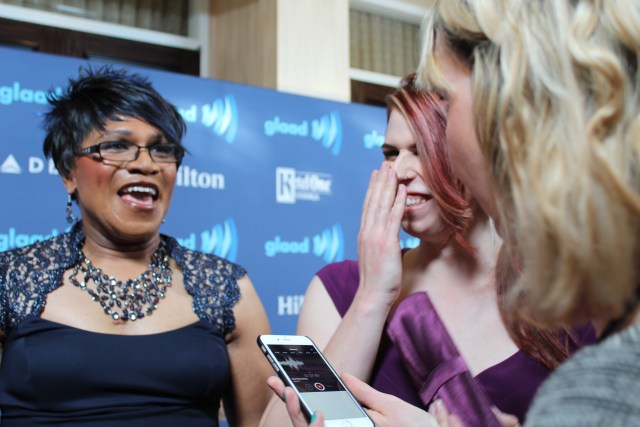
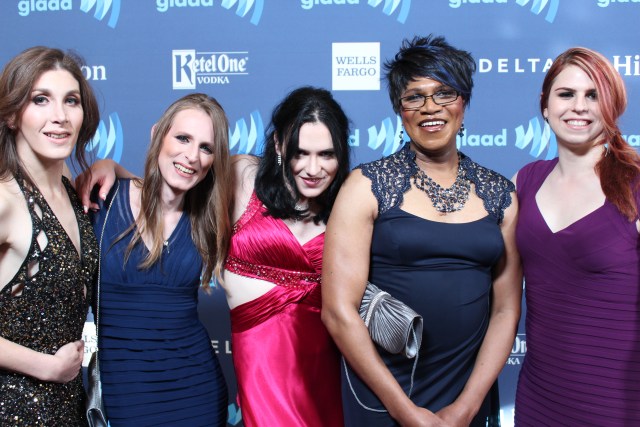
Host Tig Notaro made me laugh my ass off.

(Photo by Kevin Winter/Getty Images for GLAAD)
I’ve seen Tig now at BlogHer and at GLAAD, and at times she was too dry for both audiences (obviously much moreso at BlogHer), but always exactly as dry as I like my comedy. Like parched. It’s marvelous.
The winners for Outstanding Comedy Series (Transparent) and Outstanding Drama Series (How To Get Away With Murder) were both shows created by females, which’s a minor miracle in an industry that remains so extremely male-dominated.
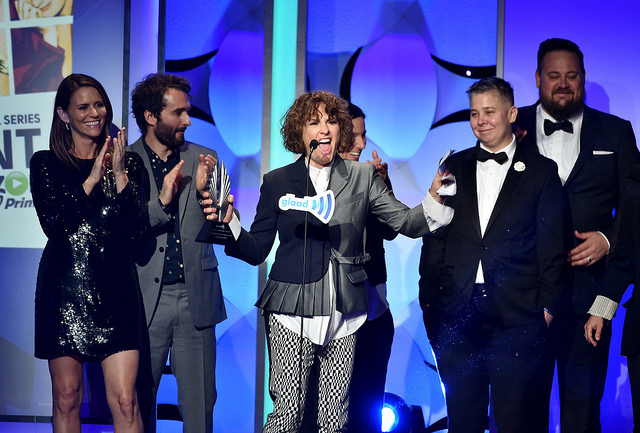
This is my facebook friend Jill Soloway (Photo by Kevin Winter/Getty Images for GLAAD)
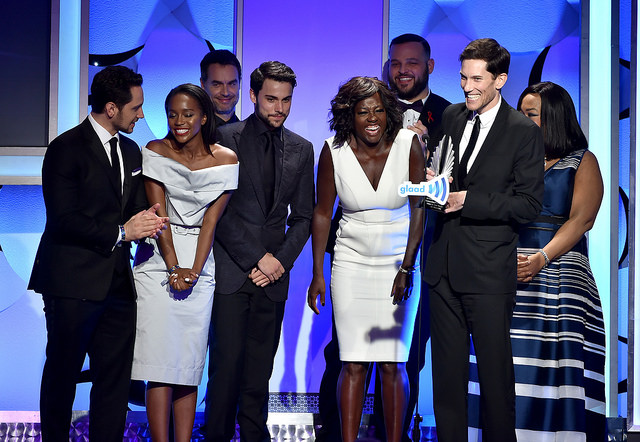
Shonda Rhimes’ “How To Get Away With Murder,” starring Viola Davis (Photo by Kevin Winter/Getty Images for GLAAD)
My A-Camper (and Autostraddle contributor) Cleo gave a speech about Glee and then Alex Newell sang a song and it was amazing.
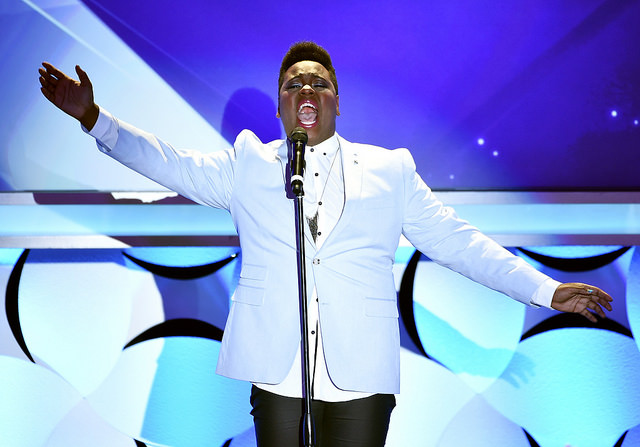
Alex Newell (Photo by Kevin Winter/Getty Images for GLAAD)
I even managed to forget that I am dying a slow death from fevercoldmonster for a solid half-hour…
… AND AUTOSTRADDLE FINALLY WON THE GLAAD AWARD FOR OUTSTANDING BLOG! That’s why the women in this pictures are so happy, it’s because they just found out that Autostraddle won Outstanding Blog:

I guess it’s possible they’re happy about something besides us, but what are the chances, really? (Photo by Charley Gallay/Getty Images for GLAAD)
Our award wasn’t actually announced out loud — along with most smaller awards, like Best Comic Book, the winners of Outstanding Blog were flashed on one of many large television screens for us to see but nothing happened onstage. However, if it had been announced out loud, I bet this girl and this guy from Girls would’ve wanted to give it to us:
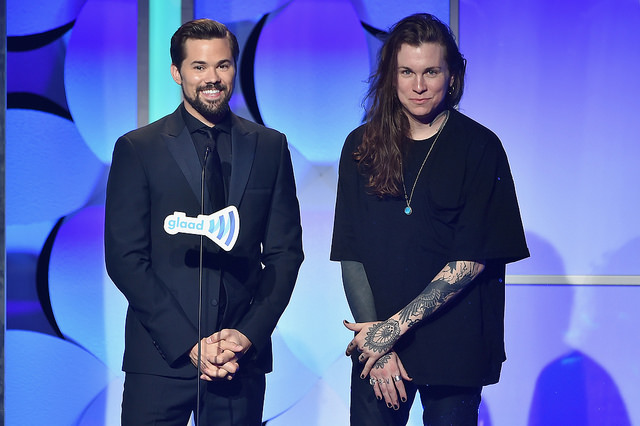
Andrew Rannells and Laura Jane Grace (Photo by Kevin Winter/Getty Images for GLAAD)
Portia’s like, “my favorite thing about Autostraddle? How can I pick just one?”

(Photo by Kevin Winter/Getty Images for GLAAD)
Look at these winners:
Almost as exciting as us winning an award was Kerry Washington’s speech when she accepted the Vanguard Award, presented to an ally in the entertainment community who has made a significant difference in promoting equal rights for LGBT people. Here’s Ellen introducing her…
…and here’s Kerry Washington BLOWING YOUR MIND:
It was a very star-studded evening! Actual homogay ladies in attendance included Samira Wiley, Hannah Hart, Antigone Rising, Jessica Clark and Nats Getty.

I have to say — and I realize that as a WINNER, my account of the evening may be biased, but it felt very triumphant, the whole thing, like a fancy parade. It also felt slightly less male-dominated than usual, and the trans female representation was outstanding — guests included Laura Jane Grace, the entire cast of New Girls on the Block as well as Transparent folks including Alexandra Billings and Our Lady J.

Our Lady J with her bedazzled crutch
I smiled so hard when Cleo was onstage that my face nearly froze that way. I clapped so loud when Kerry Washington talked about the importance of not just LGBTQ stories but diverse LGBTQ stories that I nearly slapped my hand off my own arm. My girlfriend got to talk to Daniel Franzese, the actor who portrayed the first queer character she really fell for. It was an evening infused with joy; one which acknowledged how far we’ve got to go and how far we’ve come in equal measure. The aggressive fundraising that happens at these events is often pretty easy to scoff at, but I also recognize how real the need to raise funds is, so it doesn’t bother me. They’ve got a lot of people to pay and programs to run — and hiring really good people requires providing them salaries competitive with the for-profit sector work they’re leaving behind!
Like I said, the winners of smaller awards like ours don’t get up and give speeches. But if I had given a speech, I would’ve thanked my team first and foremost, and also all of you. I would’ve thanked all of you who’ve given money, bought merchandise, joined A+, come to camp, shopped through our affiliate links, donated a campership, left a comment, hosted a meet-up, attended a meet-up, shared a post of ours on social media, sent us a delightful e-mail, told your friends about us, wrote about us in your publications or on your blogs, given us an interview, ran into us at Whole Foods, taken a reader survey or ever tried to explain what “Autostraddle” means to anyone, ever. I would’ve thanked my incredible team: firstly, my Executive Editor and Best Friend Laneia and my Co-Founder, Tiny Dancer Alex Vega. My Managing Editor Intern Rachel, sister wife for life. My Senior Editors Yvonne Marquez and Heather Hogan. My founding team: Tess, Crystal (whose praise I sing from the highest hills), Stef, Carly, Robin and Natalie. Gabby and The QPOC Speakeasy. Every single Autostraddle Subject Editor, Contributing Editor, writer, developer, designer, tech person, photographer, camp staffer, intern, illustrator, merch girl, comic artist and all the other humans who make this place run. These humans work so hard, and so many of them have worked or do work so hard for so long for free, too. All the souls who make A-Camp so fantastic, and the guests like Deanne Smith, Hannah Hart and Julie Goldman, who have leant A-Camp their starpower and used their powers for good. I would’ve thanked my dearest mother and my little brother. My girlfriend, Abby, for making me happier than I ever knew possible, and Quickbooks, for basically the same reason. Also my Dad, even though he’s dead so I’ll have to tell him about it later. Also Tinkerbell. The most important thing to take away from all of this is that it’s basically all because of Tinkerbell.

Preparing for a victory lap
It’s going to be an exciting and transformative year. I can feel it!
And here is the complete list of winners from Saturday night’s award ceremony:
Vanguard Award: Kerry Washington
Stephen F. Kolzak Award: Roland Emmerich
Outstanding Film – Wide Release: The Imitation Game (The Weinstein Company)
Outstanding Drama Series: How to Get Away with Murder (ABC)
Outstanding Comedy Series: Transparent (Amazon Instant Video)
Outstanding Individual Episode (in a series without a regular LGBT character): “Identity Crisis” Drop Dead Diva (Lifetime)
Outstanding TV Movie or Mini-Series: The Normal Heart (HBO)
Outstanding Music Artist: Against Me!, Transgender Dysphoria Blues (Xtra Mile Recordings)
Outstanding Daily Drama: Days of Our Lives (NBC)
Outstanding Comic Book : Rat Queens, written by Kurtis J. Wiebe (Image Comics)
Outstanding Digital Journalism Article: “31 Days of PrEP” [series] (Advocate.com)
Outstanding Blog: Autostraddle (autostraddle.com)
We Won A Thing: Nebraska Judge Strikes Down Same-Sex Marriage Ban, Gay Cornhuskers Could Begin Marrying Next Week
U.S. District Judge Joseph Bataillon struck down Nebraska’s same-sex marriage ban today, joining over 60 federal and state judges who have ruled in favor of marriage equality in the United States. Batallion, who cited the U.S. Constitution’s Equal Protection Clause in his ruling, refused to stay his decision, stating that his injunction will take effect one week from today, meaning that gay couples will likely be able to begin marrying on March 9.
In November, seven couples teamed up to challenge Nebraska’s same-sex marriage ban, which was voted into the state’s constitution by an overwhelming majority in the 2000 election. One of the plaintiffs, Sally Waters, is battling stage four breast cancer and is seeking the legal protection a Nebraska-recognized marriage will provide for her children in the event of her death. Waters married her partner, Susan, in California in 2008.
Judge Bataillon had some scathing words for opponents of marriage equality, writing:
The State relies essentially on variously phrased arguments that reveal a clear preference for opposite-sex parenting and express an interest in promoting biological reproduction. These arguments are rooted in archaic and overbroad stereotypes about gender roles. Marriage is about more than procreation. The State essentially pays lip service to marriage as an institution conceived for the purpose of providing a stable family unit, but it ignores the damage done to children by denial of the right to marry to numerous same-sex households.
He also seems confident that the United States Supreme Court will rule in favor of marriage equality on a national level when it hears cases from the Sixth Circuit later this summer:
The Supreme Court will ultimately endorse, for one reason or another, the [pro-equality] results obtained in the Fourth, Seventh, Ninth and Tenth Circuit challenges to same-sex marriage bans.
On Friday, Sixth Circuit challengers from Michigan, Ohio, Tennessee and Kentucky — the only states where same-sex marriage bans have been upheld — filed briefs with SCOTUS, which agreed to hear their cases late last year.
In the meantime, gay Cornhuskers are readying their vows and preparing to become the 38th state where marriage equality is a reality.
This Lesbian Couple Won A Thing: First Gay Marriage in Texas
feature image via ThinkProgress
Sarah Goodfriend and Suzanne Bryant were the first lesbian couple to legally marry in Texas after a Travis County judge ordered a county clerk to issue a marriage license.
The state’s ban on same-sex marriage is still in effect, even after a state judge ruled earlier this week that parts of Texas’ ban on same-sex marriage violates the U.S. Constitution. Travis County Clerk Dana DeBeauvoir said her office wasn’t going to issue marriage licenses to same-sex couples because the ruling didn’t include an order to do so.
However, on Wednesday morning, another state judge, District Judge David Wahlberg, ordered DeBeauvoir to issue a marriage license to Goodfriend and Bryant after the couple petitioned for emergency relief, saying their inability to get married was causing them irreparable harm since Goodfriend has been diagnosed and treated for ovarian cancer. On Thursday morning, the two were granted a marriage license and were married by Rabbi Kerry Baker and were joined by friends and their two daughters, Dawn and Ting. The couple have been together for over 30 years.
The county clerk’s office is not issuing anymore marriage licenses to same-sex couples since they were only complying with a court order.
Update 2/19/15, 4:07 pm: Attorney General Ken Paxton appealed both Tuesday’s ruling and Wahlberg’s decision and received a stay. At this point, it’s unclear what that means for Goodfriend and Bryant’s marriage, even though they were registered before the stay. Paxton says their marriage is void, “just as any license issued in violation of state law would be.” However, DeBeauvoir believes her actions are legal and the couple’s lawyer, Chuck Herring, said the Texas Supreme Court action has no affect on the couple’s marriage.
We Won Two Things: Same-Sex Marriage Bans in Arkansas and Mississippi are Ruled Unconstitutional
Feature photo courtesy of The Arkansas Times.
Arkansas and Mississippi share more than a border and a love for barbecue; today, federal judges in both states began paving the way for marriage equality in the conservative strongholds by striking down voter-approved same-sex marriage bans from 2004.
In Mississippi, where the 2004 referendum was just icing on top of the law that banned marriage equality in 1997, District Judge Carlton Reeves wrote 72 pages of pretty amazing things, including this gem:
“The Fourteenth Amendment operates to remove the blinders of inequality from our eyes. Though we cherish our traditional values, they must give way to constitutional wisdom. Mississippi’s traditional beliefs about gay and lesbian citizens led it to defy that wisdom by taking away fundamental rights owed to every citizen. It is time to restore those rights […] Today’s decision may cause uneasiness and concern about the change it will bring. Mississippi continues to change in ways its people could not anticipate even 10 years ago. Allowing same-sex couples to marry, however, presents no harm to anyone.”
And in Arkansas, District Judge Kristine Baker wrote that the same-sex marriage ban violated the Constitutional protections of gay and lesbian citizens by “precluding same-sex couples from exercising their fundamental right to marry in Arkansas, by not recognizing valid same-sex marriages from other states, and by discriminating on the basis of gender.” Her ruling follows the same decision by a state-level court in May.
What’s next? Well, the rulings have been stayed because district attorneys in both states are probably going to appeal them. Mississippi, which resides in the 5th Circuit, might get grouped with Texas and Louisiana; both will present oral arguments about the legality of same-sex marriage bans on January 9th. Arkansas is a little trickier. The Arkansas Supreme Court heard arguments in a similar case last week, and if the court rules in favor of marriage equality, that will be the end of it. If not, the district attorney will likely appeal today’s ruling by Baker.
Alternatively, the United States Supreme Court could choose to hear arguments from cases from four states from the Sixth Circuit Court of Appeals, which became the first appeals court to overturn rulings from lower courts that struck down same-sex marriage bans. (Those states are Kentucky, Tennessee, Ohio and Michigan.)
It feels like we’re racing toward the finish line, doesn’t it? Jocelyn Pritchett, one of the plaintiffs in the Mississippi case, told reporters that her wife and children danced around the living room when they heard the decision because “If gay marriage can be legal in Mississippi, the whole country can feel hope.” If SCOTUS makes the move to hear those cases, the ruling should be broad enough (this time) to answer any lingering questions about the constitutionality of marriage equality.
I couldn’t agree more. I lived in Georgia for 34 years and it felt like the rest of the universe would get marriage equality and we’d all be driving flying cars before same-sex marriage became a reality in the South. Things are happening faster then so many of us southerners ever could have imagined.
9 Not-Terrible Things That Happened in Last Night’s Election
This list was compiled and written by Rachel Kincaid, Yvonne Marquez and Heather Hogan.
Last night’s midterm election results were bleak, but before you abandon all hope and submit to the control of our latest round of Red State Overlords, take a second to remind yourself about some pretty great things that Americans voted in favor of yesterday. Here are nine of them.
1. The right to choose won
Colorado and North Dakota voted against “personhood initiatives,” which would have granted legal protection to fetuses, basically declaring that fertilized eggs are children. Reproductive rights groups breathed a huge sigh of relief, not only because the measures were struck down, but because they were struck down by an overwhelming majority (63% to 37% in Colorado, and 64% to 36% in North Dakota).
2. Weed won, too
Oregon voted yes on Measure 91, which made recreational weed use legal. If you’re 21, you’ll be able to buy marijuana starting in July. Alaska passed Ballot Measure 2, which will also legalize weed, but it’ll take longer for Alaskans to be able to purchase it; the Department of Commerce has nine months to set up a way to regulate marijuana sales. Citizens of Washington D.C. still can’t buy weed, but they voted to make it legal to possess two ounces of it, as long as you’re over 21.
Florida needed 60% of the vote to legalize medical marijuana, but they only captured 57%. Alas.
3. More people will make a livable wage soon
Alaska, Arkansas, Nebraska, and South Dakota, states not generally known as fiscally progressive strongholds, all passed ballot measures to raise the minimum wage past its $7.25/hr federal baseline. In most states, the measures even passed by a significant margin (except for South Dakota, where it won by only 53%). The increase won’t come immediately — not until 2016 or 2017, depending on the state. But in Alaska and South Dakota, it’s more than just a one-time increase; the minimum wage is now linked to inflation, so it can continue to rise to keep up with the cost of living.
Individual cities and local elections, like those of San Francisco, Oakland and Milwaukee, also saw minimum wage increases get passed, which will also be phased in over time and which will hopefully make daily life and supporting a family more feasible for hourly wage workers.
4. Scott Brown lost to a woman — again
The former Republican senator from Massachusetts made gazillions of enemies back in 2012 with his misogynistic attacks on Elizabeth Warren, a thing that contributed to her complete shellacking of him in the election. So Brown moved to New Hampshire to try to unseat Democratic senator Jeanne Shaheen. She smacked him down too, with plenty of help from Elizabeth Warren.
5. Gina Raimondo became the first female governor of Rhode Island
The state treasurer beat out both a Republican and Independent candidate after promising a complete overhaul of the state’s ailing pension program. Despite being a pretty heavily Democratic state, Rhode Island hasn’t elected a Democratic governor since the Clinton administration. An unapologetic social liberal, Raimondo has been an outspoken supporter of marriage equality and immigration reform. And she rode that wave of progressive thinking to victory.
6. A record number of women were elected
100 women will serve in the 114th Congress, the largest number ever, thanks in large part to a push from the Republican party to elect female representatives to combat the inevitable “Grand Old White Man Party” label they’ll be branded with during 2016 presidential election (due to the fact that it is true). Sadly, most of the women who were elected are vehemently opposed to abortion and marriage equality. But hey, maybe the United States won’t rank 86th in the world anymore when it comes to electing female politicians.
7. Texans struck down fracking for the first time
Denton became the first place in Texas to ban fracking inside the city limits, despite the huge amount of money the oil industry funneled into the campaign to vote down the ban. It turns out citizens of Denton are more concerned about protecting their natural resources and, you know, not causing earthquakes than they are with making rich white assholes even richer. Clear eyes, full hearts, can’t lose.
8. Dallas did right by its LGBT citizens
Dallas voters added nondiscrimination protections for LGBT city employees to the City Charter with 77 percent supporting to add both “sexual orientation and “gender identity and expression.” Dallas already had similar nondiscrimination protections in their equal employment opportunity policy but wasn’t included in the City Charter.
9. California takes a stand against the War on Drugs and mass incarceration
Californians approved Proposition 47, which will “change six low-level, nonviolent offenses — including simple drug possession — from felonies to misdemeanors.” That means 20,000 people will be eligible for re-sentencing, and between 20,000 and 40,000 will avoid incarceration for drug-related misdemeanors. The Drug Policy Alliance estimates that the measure will save the state up to a billion dollars, all of which will be funneled to “schools, victim services, and mental health and drug addiction treatment.”
We Won A Thing, With Some Qualifiers: Federal Judge Rules Idaho’s Same-Sex Marriage Ban Unconstitutional
Today Idaho became the latest state with a ban on same-sex marriage to have it declared unconstitutional by a federal judge. Four same-sex Idaho couples had filed a lawsuit against the state, and Judge Candy Dale ruled on the side of their argument that banning same-sex marriage violated the rights guaranteed by the Due Process and Equal Protection Clauses of the constitution. Sue Latta and Traci Ehlers, Lori and Sharene Watsen, Shelia Robertson and Andrea Altmayer, and Amber Beierle and Rachael Robertson, the four couples who are plaintiffs in the lawsuit, have a range of experiences: two of the couples are already married, but in other states, and Idaho refuses to recognize their marriages; two couples are raising children together. As long as no higher court intervenes, the state can no longer enforce any laws that restrict same-sex couples from marrying, nor can they refuse to recognize marriages from out of state.
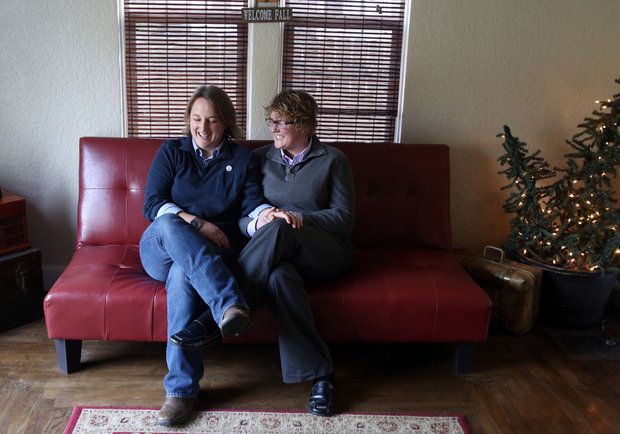
Plaintiffs Amber Beierle and Rachael Robertson, photo credit Joe Jaszewski at the Idaho Statesman
Lifting a ban on same-sex marriage isn’t the same as legalizing it, and couples who want to marry will likely still face obstacles. It’s also entirely possible that a higher court will intervene; last year Utah’s same-sex marriage ban was lifted, but the Supreme Court later reinstated it at the state’s request. Governor Otter has been vocal about his desire for a stay in this case, even before the ruling was made today. He’s declared that he’ll take this case to the Ninth Circuit Court of Appeals, and if they don’t agree with him, to the Supreme Court. Part of Otter’s argumentation is that an immediate stay is ultimately better for the same-sex couples of Idaho than what’s happened in states like Utah, California or Michigan, where a brief period of legal marriage was later halted by a stay, creating a situation where some couples married before the stay was enacted. This seems like a flawed argument, since most, including the couples themselves, agree it would ultimately be best for them to be able to marry and use their constitutional rights.
Legal battles like the one in Idaho are a reminder of how complex the legal terrain remains for same-sex couples who wish to marry, even after the repeal of DOMA. It seems that if Governor Otter has a say — and he does, as governor — it will be a while before any Idahoans in same-sex couples are able to marry. But this is ultimately an important positive step for marriage equality in Idaho, and with as much perseverance as these plaintiffs and many other activists have shown, suggests that legalized same-sex marriage equality is an achievable goal.
Sunday Funday Is About Gay Moms, Charice’s Sense of Self, and Everything Related to the Golden Girls
Hello, Sunday Funday Ice Cream Sundaes! You’re the best softball team ever.
Michigan Moms Love Equality
Lots of folks had reason to celebrate when Michigan’s gay marriage ban was struck down, but nobody was more deeply moved by it in a way that will also deeply move you than these plaintiff moms.
Detroit ABC affiliate WXYZ was there to capture the moment at the couple’s kitchen table as their attorney, Dana Nessel, read portions of U.S. District Judge Bernard Friedman’s decision finding that Michigan’s voter-approved constitutional amendment forbidding same-sex marriage violated the U.S. Constitution.
“It’s unbelievable,” DeBoer, 42, said in the moments after hearing the decision. “We got our day in court. We won.”
Elaine Stritch: Oh, Am I An Icon, I Had No Idea
Elaine Stritch may not be Bea Arthur, but she’s still damn cool.
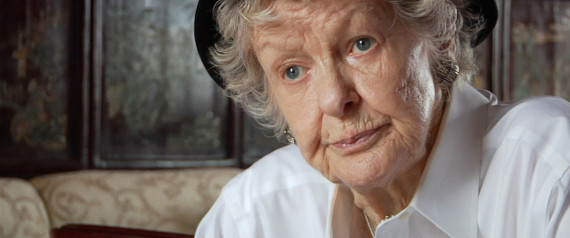
Even though she’s now a (semi) retiree, Elaine Stritch proves she hasn’t lost a bit of the sass, talent and tenacity which made her a stage and screen legend in an interviewwith Pride Source’s Chris Azzopardi.
Still, the 89-year-old star, whose new documentary, “Elaine Stritch: Shoot Me,” is earning rave reviews from critics and fans, says she’s surprised to learn that she’s considered a gay icon.
“I’m just becoming aware of it,” she says. “I really have become very much aware, first of all, what great audiences they are.”
Charice Is Doing Better Than Ever
Charice is happy when she sings, which is pretty badass since she’s so good at it, and now that she’s doing it while she wears what the f*ck makes her feel good it’s even better.

She talked to Trish Bendix about her transformation, her future, and her feelings:
The freeness Charice feels trumps anything she might have lost from her deciding to fully embody herself in both her personal and professional lives. While sexuality and gender identity are still inconvenient concepts for some people to grasp, Charice’s voice is no less awe-inducing than it was five years ago, when it came from a tiny girl in a dress.
“The more I see telling me, ‘You’re so pretty when you’re wearing that dress,’ the more I know it didn’t make me happy,” Charice said. “It made me sad because every time I saw something online, like a lesbian couple and one is like me, I could imagine myself like that; telling myself ‘That’s me. That’s what I want.’ And it made me sad because I would think of other people around me that would be disappointed and basically I didn’t listen to my heart. So finally, I just woke up and told myself that’s it. I really want to be myself because I owe it to myself and I didn’t want to be depressed anymore.”
Any true Chaster wouldn’t want that for her either.
Go Go Tennessee Equality!
Tennessee has no time to waste before they start recognizing gay marriages — no matter how hard they try.
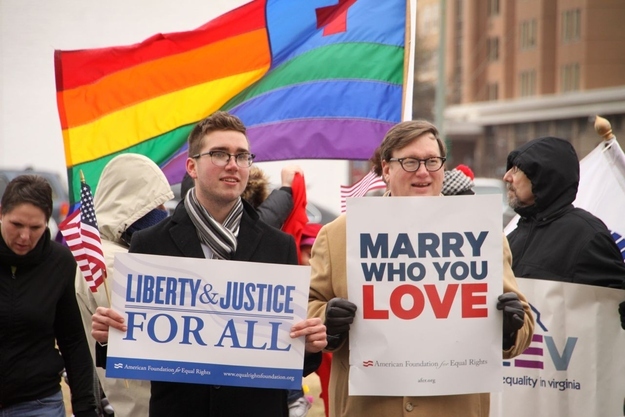
The NYT Is Over “Homosexual”
The New York Times is totally over the word “homosexual.”

but outdated and stuff is all
In the early 2000s, when same-sex marriage was a brand-new concept, gays were routinely described in mainstream media as homosexuals. Today, use of the word is less and less frequent. A Google Books scanshows a sharp decline in its use in recent years after peaking around 1995.
Scholars expect the use of the term to eventually fall away entirely.
“These shifts always reflect a change in sensibility,” said Geoffrey Nunberg, a linguist who teaches at Berkeley. “That’s what happened when ‘Negro’ yields to ‘black’ and ‘African-American.’ It’s just an old-fashioned word that denotes a generally neutral but old-fashioned sensibility.”
These Dogs Are Super Hungry
Open hands everywhere but not a treat to snack on.
We Won A Thing: Michigan Judge Rules Same-Sex Marriage Ban Unconstitutional
During the first week of March, Michigan watched a two-week trial meant to decide whether the state would continue to uphold its ban against same-sex marriage. Today, Judge Bernard Friedman declared the ban unconstitutional. There’s been no stay of the ruling (like the one that kept California’s couples from marrying after Prop 8 was repealed) officially issued, although Michigan Attorney General Bill Schuette has filed an emergency request for one.
The lawsuit against the state was brought by April DeBoer and Jayne Rowse, who were driven to sue because without marriage, they can’t both adopt their children. The prospect of repealing the ban is a controversial one; the trial saw Michiganders traveling from across the state to protest outside the courthouse both in support of and in opposition to the same-sex marriage ban. The ban dates back to 2004, when voters passed a ballot measure restricting marriage to one man and one woman, and includes language that specifically includes civil unions. The ban was put on the ballot not by a legislator, by a successful petition by conservative citizens; 2.7 million people voted to pass the ban.
While same-sex marriage victories have been multiplying across the US, from Utah to Kentucky. Increasingly, we’re seeing at least some steps forward in states usually considered conservative, or ideologically committed to “traditional marriage.” While Michigan may not seem as unlikely a marriage equality success story as some states more widely understood to be conservative, its relationship to LGBT equality is more complicated than those outside the state may assume. Michigan voted Democratic in the year 2004, the same year that it passed the same-sex marriage ban; Kerry won the state by a 3.4% margin. More recently, it was arguably a swing state in 2012, but ultimately went for Obama with a margin of 9.5%. But while Democrats have managed wins in Michigan recently, that’s far from meaning that Michigan is a particularly liberal state, or that it’s necessarily socially progressive. In fact, the majority of counties in Michigan supported Romney in 2012:
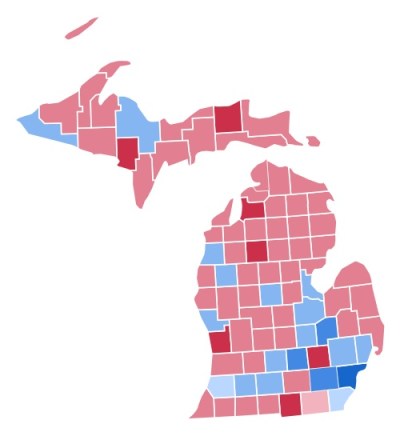
Although it doesn’t always have the same anti-gay rap as states to the South, Michigan is a fairly consistently unwelcoming place for its LGBTQ residents. In 2011, the state attempted to pass a bill that would prohibit ordinances extending discrimination protections to LGBT people in 18 cities. It succeeded in passing a bill that retracted health benefits from the same-sex domestic partners of municipal employees. It’s still perfectly legal in Michigan to fire someone based on their sexual orientation or gender identity/presentation. In 2012, LGBT community leaders of Michigan launched a 100-day hunger strike to draw attention to their treatment by their state government, calling Michigan an “extreme anti-equality environment.” David Garcia, executive director of Affirmations, said that “One could argue that Michigan is the Mississippi of the civil rights movement when it comes to gay equality. We are constantly behind on many issues, and many people don’t know it.”
As marriage victories have multiplied, they’ve been followed by increasingly vocal reminders that the LGBT community has other (and for many people, more critical) issues to contend with: disproportionate levels of poverty, substance abuse, incarceration, poor access to healthcare, and more. In Michigan, the contrast between the focus on marriage equality and issues of employment and economic discrimination is a telling one. Although polls indicate that support for same-sex marriage is higher than ever, Michigan raises the question of whether support for same-sex marriage is the same as support for the people in those marriages. While the repeal of the ban is excellent news, and will hopefully lead to many families like DeBoer and Rowse’s experiencing increased stability and security, it’s important to remember that marriage isn’t the whole battle; many LGBT people in Michigan still face imposing challenges, and the solutions for those aren’t necessarily in sight.
We Won A Thing: Judge Rules You Can’t Take The Same-Sex Marriage Out of Texas
Holy fuck, y’all! A federal judge in San Antonio says that banning homogays from marrying each other in my beloved home state of TEXAS is unconstitutional. I knew we were next!
U.S. Judge Orlando Garcia granted the two same-sex couples who filed the lawsuit an injunction that strikes down the state’s same-sex marriage ban, but stayed it from taking into effect — pending the outcome of any appeals to the conservative Fifth Circuit Court of Appeals.
“Texas’ current marriage laws deny homosexual couples the right to marry, and in doing so, demean their dignity for no legitimate reason,” Judge Garcia said. “Accordingly, the Court finds these laws are unconstitutional and hereby grants a preliminary injunction enjoining Defendants from enforcing Texas’ ban on same-sex marriage.”
Thank La Virgen that Judge Garcia rejected arguments from gubernatorial candidate and Attorney General Greg Abbott’s office (ugh, fuck that guy) which included arguments like “traditional marriage best supports the state’s interest in promoting responsible procreation and child rearing” and that “same-sex marriage is a recent innovation that cannot be seen as a fundamental right that must be protected by the courts.”
So this is one giant step in the right direction, but we can’t get married (if you wanted to, of course) just yet. Texas joins a few other states who were “stayed” including Utah, Oklahoma and Virginia in this big waiting room limbo to hear a decision be made from the appeals courts.
In the meantime, let’s take a moment to happy dance because omgossh TEXAS!
